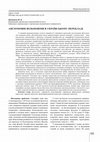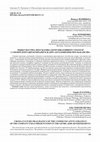Papers by Natalia Ivanytska
Polonia University Scientific Journal
Науковий вісник ДДПУ імені Івана Франка. Серія: Філологічні науки (мовознавство)

Aktualʹnì pitannâ gumanìtarnih nauk, 2022
The article focuses on the genre «job advertisement» as a part of modern employment discourse. Th... more The article focuses on the genre «job advertisement» as a part of modern employment discourse. The topicality of thework is determined by some factors. The problem is currently relevant for linguistic research due to globalization changesin the labor market, which change the communicative roles and tasks of the addresser and the addressee. Moreover, the intensification of network communication also specifies a virtual dialogue between employer and employee and predominates strategies and tactics to achieve communicative goals. This article aims at the cross-culture pragmatic profile of company’s self-presentation strategy in Ukrainian and English job advertisements. We selected 518 Ukrainian and 392 English language samples to present the company’s self-presentation strategy. The units were selected from online job advertisements (200 advertisements each from work.ua and reed.com.uk sites, found through the "Vacancies in IT" filter). The strategy involves the following communicative and pragmatic tactics: 1) appealing to reputation and stability, 2) proactivity, 3) appealing to expansion, 4) appealing to product quality, 5) positive working environment. Using quantitative methods of analysis, we have established that the company’s self-presentation strategy has the advantage of verbal expression on the Ukrainian website. The Ukrainian employers appeal to tactics of positive working environment in the company (30%), proactivity (27%) and expansion (24%). The English discourse prefer the tactics of appealing to reputation and stability (36%) and expansion (28%). We also compared the communicative and pragmatic profile of the self-presentation strategy in Ukrainian and English discourse. In particular, we have revealed that Ukrainian employers target the employees by comfortable work space and proactive plans. British companies present themselves by excellent reputation, stability and international expansion. Key words: employment discourse, genre “job advertisement”, communicative and pragmatic strategy, selfpresentation of the company, communicative tactics.
Humanities science current issues
INNOVATIVE PATHWAY FOR THE DEVELOPMENT OF MODERN PHILOLOGICAL SCIENCES IN UKRAINE AND EU COUNTRIES
Journal of Entrepreneurship Education, 2021
"Scientific notes of V. I. Vernadsky Taurida National University", Series: "Philology. Journalism", 2021
Scientific notes of Taurida National V.I. Vernadsky University, series Philology. Social Communications, 2020
"Scientific notes of V. I. Vernadsky Taurida National University", Series: "Philology. Journalism", 2021

Вчені записки ТНУ імені В. І. Вернадського. Серія: Філологія. Журналістика, 2021
The article analyses the modern translation strategies and tactics of English-language films titl... more The article analyses the modern translation strategies and tactics of English-language films titles of recent
years. The relevance of this research is determined by a number of factors, including: interest of linguists in
the processes of nomination of films as a specific extralinguistic reality, intensification of typological researches
of film titles, development of Ukrainization of film industry on the basis of traditions and new tendencies. The
main trends in the development of strategies of foreignization and domestication in the context of translation
of film titles were traced and relevant ways of translation of film titles into Ukrainian from the standpoint
of translation studies and linguopragmatics were identified. The analysis involved 300 English-language titland their Ukrainian translations (released in recent years (2018–2020). The film titles were selected using
the “Random Film” service from the online resource “Cinema. Theatre. Ua” (https://kino-teatr.ua/ru/main/
films/year/2020/page/17.phtml).
There are considerations on the relevance of choosing one of the strategies of film title translation:
domestication or foreignization. Proponents of domestication emphasize the difficulty of finding content-relevant
and culturally identical matches in multilingual systems and the importance of overcoming cultural barriers
by addressing national realities. Proponents of the foreignization base their arguments on the following facts:
an authentic image of a foreign cultural colour expands the linguistic and cultural competence of the reader,
forms his general development and tolerance for other cultures.
The thesis proved that the choice of domestication or foreignization is determined by a number of linguistic
as well as marketing and pragmatic factors. It has been found that direct, transformational and indirect
translation tactics have been used in the translation of English-language films titles in recent years.
The research showed the desire of localizers to preserve the intentions of filmmakers, as evidenced by
the more frequent use of direct (56%) and transformational (33%) translation. Indirect translation covers
only 11% of the total number of analysed language pairs, but its specificity leaves a wide field of discussion
for further scientific research and discussions involving the communicative, pragmatic and psycholinguistics
aspects.
Key words: film title, domestication, foreignization, translation tactics, direct translation, transformational
translation, indirect translation

Актуальні питання гуманітарних наук: міжвузівський збірник наукових праць молодих вчених Дрогобицького державного педагогічного університету імені Івана Франка, 2022
The article focuses on the genre «job advertisement» as a part of modern employment discourse. Th... more The article focuses on the genre «job advertisement» as a part of modern employment discourse. The topicality of thework is determined by some factors. The problem is currently relevant for linguistic research due to globalization changesin the labor market, which change the communicative roles and tasks of the addresser and the addressee. Moreover,
the intensification of network communication also specifies a virtual dialogue between employer and employee and
predominates strategies and tactics to achieve communicative goals. This article aims at the cross-culture pragmatic
profile of company’s self-presentation strategy in Ukrainian and English job advertisements. We selected 518 Ukrainian and 392 English language samples to present the company’s self-presentation strategy. The units were selected from
online job advertisements (200 advertisements each from work.ua and reed.com.uk sites, found through the "Vacancies in IT" filter). The strategy involves the following communicative and pragmatic tactics: 1) appealing to reputation and stability, 2) proactivity, 3) appealing to expansion, 4) appealing to product quality, 5) positive working environment. Using quantitative methods of analysis, we have established that the company’s self-presentation strategy has the advantage of verbal expression on the Ukrainian website. The Ukrainian employers appeal to tactics of positive working environment in the company (30%), proactivity (27%) and expansion (24%). The English discourse prefer the tactics of appealing to reputation and stability (36%) and expansion (28%). We also compared the communicative and pragmatic profile of the self-presentation strategy in Ukrainian and English discourse. In particular, we have revealed that Ukrainian employers target the employees by comfortable work space and proactive plans. British companies present themselves by excellent
reputation, stability and international expansion.
Key words: employment discourse, genre “job advertisement”, communicative and pragmatic strategy, selfpresentation of the company, communicative tactics.

У статті здійснено спробу довести валідність використання моделі речення простої дієслівної будов... more У статті здійснено спробу довести валідність використання моделі речення простої дієслівної будови як основи зіставлення реченнєвотвірного потенціалу української та англійської дієслівних систем. Проаналізовано та систематизовано різні підходи до поняття «модель речення» в лінгвославістиці та лінгвогерманістиці, означено поняття «предикативний мінімум речення» та «номінативний мінімум речення». Увагу зосереджено на пріоритетності використання в контрастивному аналізі номінативного мінімуму речення як розширеної схеми, що містить мінімальну структурну схему речення (головні компоненти) та обов’язкові прислівні поширювачі, необхідні для реалізації реченням номінативної функції. Моделі речень дієслівної будови виділені з опорою на дієслівну синтагматику і ранжовані за сполучувальними ознаками дієслів, поєднаними з узагальненою синтаксичною семантикою експлікаторів синсемантизму. Здійснена типологізація моделей простих речень дієслівної будови, використання якої в установленні синтагмат...

Arab World English Journal
The article aims to assess the efficiency of flipped learning as one of the most up-to-date metho... more The article aims to assess the efficiency of flipped learning as one of the most up-to-date methods when teaching English for the EFL students in Ukraine. The significance of the study bases on the necessity to implement advanced teaching practices during the COVID-19 pandemic since online learning requires constructive changes in the traditional system of education. It is necessary to shift from the direct knowledge transfer to searching and cognition of new information by students, to change the teacher’s role to being ‘a facilitator’ and organizer of various academic activities. The article outlines the main characteristics of flipped learning, including flexibility, individualization, differentiation, and opportunities for students to learn at any place or time. The contribution of this research is to estimate new experiences of University students due to flipped learning implementation. It was achieved due to analyzing responses to the survey-based questionnaire of 48 learners ...
Advanced Education, Jun 16, 2018

Uploads
Papers by Natalia Ivanytska
years. The relevance of this research is determined by a number of factors, including: interest of linguists in
the processes of nomination of films as a specific extralinguistic reality, intensification of typological researches
of film titles, development of Ukrainization of film industry on the basis of traditions and new tendencies. The
main trends in the development of strategies of foreignization and domestication in the context of translation
of film titles were traced and relevant ways of translation of film titles into Ukrainian from the standpoint
of translation studies and linguopragmatics were identified. The analysis involved 300 English-language titland their Ukrainian translations (released in recent years (2018–2020). The film titles were selected using
the “Random Film” service from the online resource “Cinema. Theatre. Ua” (https://kino-teatr.ua/ru/main/
films/year/2020/page/17.phtml).
There are considerations on the relevance of choosing one of the strategies of film title translation:
domestication or foreignization. Proponents of domestication emphasize the difficulty of finding content-relevant
and culturally identical matches in multilingual systems and the importance of overcoming cultural barriers
by addressing national realities. Proponents of the foreignization base their arguments on the following facts:
an authentic image of a foreign cultural colour expands the linguistic and cultural competence of the reader,
forms his general development and tolerance for other cultures.
The thesis proved that the choice of domestication or foreignization is determined by a number of linguistic
as well as marketing and pragmatic factors. It has been found that direct, transformational and indirect
translation tactics have been used in the translation of English-language films titles in recent years.
The research showed the desire of localizers to preserve the intentions of filmmakers, as evidenced by
the more frequent use of direct (56%) and transformational (33%) translation. Indirect translation covers
only 11% of the total number of analysed language pairs, but its specificity leaves a wide field of discussion
for further scientific research and discussions involving the communicative, pragmatic and psycholinguistics
aspects.
Key words: film title, domestication, foreignization, translation tactics, direct translation, transformational
translation, indirect translation
the intensification of network communication also specifies a virtual dialogue between employer and employee and
predominates strategies and tactics to achieve communicative goals. This article aims at the cross-culture pragmatic
profile of company’s self-presentation strategy in Ukrainian and English job advertisements. We selected 518 Ukrainian and 392 English language samples to present the company’s self-presentation strategy. The units were selected from
online job advertisements (200 advertisements each from work.ua and reed.com.uk sites, found through the "Vacancies in IT" filter). The strategy involves the following communicative and pragmatic tactics: 1) appealing to reputation and stability, 2) proactivity, 3) appealing to expansion, 4) appealing to product quality, 5) positive working environment. Using quantitative methods of analysis, we have established that the company’s self-presentation strategy has the advantage of verbal expression on the Ukrainian website. The Ukrainian employers appeal to tactics of positive working environment in the company (30%), proactivity (27%) and expansion (24%). The English discourse prefer the tactics of appealing to reputation and stability (36%) and expansion (28%). We also compared the communicative and pragmatic profile of the self-presentation strategy in Ukrainian and English discourse. In particular, we have revealed that Ukrainian employers target the employees by comfortable work space and proactive plans. British companies present themselves by excellent
reputation, stability and international expansion.
Key words: employment discourse, genre “job advertisement”, communicative and pragmatic strategy, selfpresentation of the company, communicative tactics.
years. The relevance of this research is determined by a number of factors, including: interest of linguists in
the processes of nomination of films as a specific extralinguistic reality, intensification of typological researches
of film titles, development of Ukrainization of film industry on the basis of traditions and new tendencies. The
main trends in the development of strategies of foreignization and domestication in the context of translation
of film titles were traced and relevant ways of translation of film titles into Ukrainian from the standpoint
of translation studies and linguopragmatics were identified. The analysis involved 300 English-language titland their Ukrainian translations (released in recent years (2018–2020). The film titles were selected using
the “Random Film” service from the online resource “Cinema. Theatre. Ua” (https://kino-teatr.ua/ru/main/
films/year/2020/page/17.phtml).
There are considerations on the relevance of choosing one of the strategies of film title translation:
domestication or foreignization. Proponents of domestication emphasize the difficulty of finding content-relevant
and culturally identical matches in multilingual systems and the importance of overcoming cultural barriers
by addressing national realities. Proponents of the foreignization base their arguments on the following facts:
an authentic image of a foreign cultural colour expands the linguistic and cultural competence of the reader,
forms his general development and tolerance for other cultures.
The thesis proved that the choice of domestication or foreignization is determined by a number of linguistic
as well as marketing and pragmatic factors. It has been found that direct, transformational and indirect
translation tactics have been used in the translation of English-language films titles in recent years.
The research showed the desire of localizers to preserve the intentions of filmmakers, as evidenced by
the more frequent use of direct (56%) and transformational (33%) translation. Indirect translation covers
only 11% of the total number of analysed language pairs, but its specificity leaves a wide field of discussion
for further scientific research and discussions involving the communicative, pragmatic and psycholinguistics
aspects.
Key words: film title, domestication, foreignization, translation tactics, direct translation, transformational
translation, indirect translation
the intensification of network communication also specifies a virtual dialogue between employer and employee and
predominates strategies and tactics to achieve communicative goals. This article aims at the cross-culture pragmatic
profile of company’s self-presentation strategy in Ukrainian and English job advertisements. We selected 518 Ukrainian and 392 English language samples to present the company’s self-presentation strategy. The units were selected from
online job advertisements (200 advertisements each from work.ua and reed.com.uk sites, found through the "Vacancies in IT" filter). The strategy involves the following communicative and pragmatic tactics: 1) appealing to reputation and stability, 2) proactivity, 3) appealing to expansion, 4) appealing to product quality, 5) positive working environment. Using quantitative methods of analysis, we have established that the company’s self-presentation strategy has the advantage of verbal expression on the Ukrainian website. The Ukrainian employers appeal to tactics of positive working environment in the company (30%), proactivity (27%) and expansion (24%). The English discourse prefer the tactics of appealing to reputation and stability (36%) and expansion (28%). We also compared the communicative and pragmatic profile of the self-presentation strategy in Ukrainian and English discourse. In particular, we have revealed that Ukrainian employers target the employees by comfortable work space and proactive plans. British companies present themselves by excellent
reputation, stability and international expansion.
Key words: employment discourse, genre “job advertisement”, communicative and pragmatic strategy, selfpresentation of the company, communicative tactics.